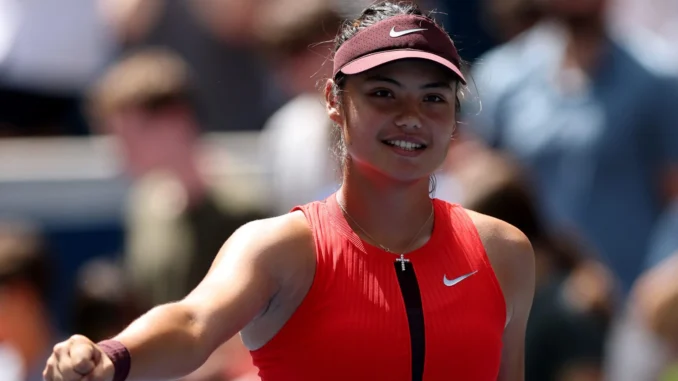
In the unforgiving crucible of professional tennis, where a single errant shot can unravel dreams and the pressure of a nation’s hopes weighs heavier than a waterlogged grip, Emma Raducanu continues to forge a saga of relentless determination. The 22-year-old Briton, whose 2021 US Open victory transformed her from wildcard unknown to global icon, has weathered a storm of challenges—surgeries on her wrist and ankle, a revolving door of coaches, and the unpredictable sting of injuries. Yet, as the 2025 WTA Tour’s Asian swing reaches its crescendo, Raducanu emerges from the Korea Open in Seoul not as a defeated contender but as a warrior reborn. Despite a heart-wrenching second-round loss, she has achieved a milestone not seen since August 2022, soaring to World No. 32 in the WTA rankings—a testament to her grit and a beacon of her unyielding potential in a season marked by bold risks and tantalizing near-victories.
The Korea Open, a WTA 500 event set against Seoul’s vibrant urban pulse, carried a special resonance for Raducanu. Entering as the No. 8 seed, she arrived with the momentum of a career-high 19 tournaments played in 2025—a deliberate defiance of the injury-prone narrative that once dogged her post-US Open career. Her decision to accept a wildcard into Seoul, however, ignited a firestorm of debate. By opting out of Great Britain’s Billie Jean King Cup finals, where her teammates battled gamely but fell to powerhouses like the United States, Raducanu drew sharp criticism. Team captain Anne Keothavong didn’t mince words, calling the absence “disappointing,” a sentiment that rippled through British tennis circles and social media. For Raducanu, the choice was strategic, a calculated pivot toward her individual ascent in a season where every match counts toward her long-term vision. “I’ve always believed in focusing on what drives my long-term growth,” she might say, her resolve a lighthouse amid the tempest of public opinion.
Her campaign kicked off with a cinematic first-round clash against Romania’s Jaqueline Cristian, ranked just below her at No. 41. Down 3-1 in both sets and battered by rain delays that stretched the match beyond two hours, Raducanu summoned a tenacity that has become her signature. Her blistering baseline rallies and a serve now peaking at 110 mph turned the tide, delivering a 6-3, 6-4 triumph that echoed her semi-final run in Seoul three years prior. “Coming from behind like that builds real confidence,” she declared courtside, her drenched ponytail framing a grin of quiet satisfaction. The victory showcased her refined game: a tighter error count, bolder net forays, and the tactical acumen sharpened under her latest coach, David Roig. Their bond, nurtured over casual golf outings and post-practice dinners, has injected a technical polish, with a rigorous fitness regimen anchoring her newfound durability.
The second round, however, was a brutal lesson in tennis’s fine margins. Facing Barbora Krejcikova, the Czech veteran with two Grand Slam titles and a prior win over Raducanu at Eastbourne, the match unfolded as a three-hour epic. Raducanu claimed the first set 6-4, her forehand slicing through Seoul’s humid air like a blade. At 5-4 in the second, serving for the match, she stood three points from victory, each a pulse-pounding chance to topple a titan. The Seoul crowd—expats and locals alike—leaned forward, sensing history. But Krejcikova, a master of clutch escapes, thwarted all three match points with a mix of grit and guile, stealing the tie-break 12-10 after a grueling 18-point battle. The third set saw Raducanu’s legs falter, her energy sapped, as Krejcikova cruised 6-1. “It’s tough to lose like that, especially when you’re so close,” Raducanu admitted post-match, her voice raw but resolute. “But these battles sharpen you. I felt the level in my legs and my shots—it’s there, just need to close tighter.”
The loss, though painful, didn’t derail her ascent. Defending quarter-final points from 2024, her 60-point haul in Seoul was enough to lift her from No. 35 to No. 32, erasing the shadow of her 2022 post-US Open slide when the weight of sudden stardom nearly crushed her. This rankings milestone caps a season of fearless encounters: a statement win over Amanda Anisimova at Indian Wells, a near-upset of Aryna Sabalenka in Melbourne, and a dogged third-round stand against Elena Rybakina at Flushing Meadows. “The world’s best always have a point to prove against me,” she mused after New York, embracing the bullseye on her back. “It motivates me to match their fire.” Her 19-event campaign in 2025 has silenced doubters who questioned her stamina, blending the audacity of her prodigy days with the savvy of a seasoned pro.
Now, Beijing’s WTA 1000 looms as a golden opportunity. Seeded in the main draw, Raducanu faces a qualifier—potentially Donna Vekic—in the second round, with a blockbuster clash against Jessica Pegula possible in the third. A deep run could propel her into the top 25, cementing a seed for the 2026 Australian Open and a shot at the WTA Finals. “My goal is clear: crack the top 32 by Melbourne, then build from there,” she affirmed recently, her ambition grounded in the humility of one who’s tasted both glory and grind. Off the court, her star burns bright—fashion endorsements and charity initiatives flourish—but the court remains her proving ground, where every point is a brushstroke on a canvas of comeback.
In Seoul’s neon-lit aftermath, Raducanu didn’t hoist the trophy, but she reclaimed something more enduring: belief. This No. 32 ranking isn’t a summit; it’s a springboard. As the WTA Tour charges toward Asia’s grand stages, Raducanu strides forward, her racket a wand of possibility. The sting of those lost match points? It’s the spark for her next blaze. In tennis’s relentless theater, Emma Raducanu is crafting her encore—one defiant, dazzling point at a time.
Leave a Reply